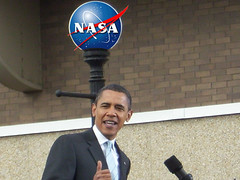Whither NASA?
On the campaign trail a year or so ago, then-Presidential candidate Barack Obama said he would cut NASA money to help fund education. Then he changed his tune, saying he would add money to NASA’s budget to help ease the transition from the Shuttle era – which will end abruptly with the last Shuttle launch in 2010 – to the age of Constellation, NASA’s program for future manned spaceflight using the new Ares rockets, still being designed and built.
 |
Then came rumors that NASA chief Mike Griffin was giving Obama’s NASA transition team a lot of static. Griffin denounced those rumors, but that doesn’t do much in real life to dispel them; denials never do. And so the whispers still exist that Constellation may suffer cuts, drastic or otherwise.
At the same time, Obama is making an incredibly strong showing of his support for science. Nobel Laureate Steven Chu will head the Department of Energy. Physicist John Holdren will be his science advisor. Jane Lubchenco will head the NOAA. These people are all highly-trained scientists at the top of their game, not policy wonks or campaign contributors or just plain old buddies grossly unqualified to run a lemonade stand, let alone a government agency.
A fresh wind is blowing through the White House, and it’s taking away the stench of antiscience. To doubly mix a metaphor, it looks like the jackbooted heel that’s been at the throat of science for eight years is about to get the boot.
Still and all… where does NASA fit in with all this? It has always been scrutinized for wasting money. That’s not surprising, given how high profile NASA missions are, and how expensive they seem. When an astronaut loses a $100,000 tool bag over the side of the space station, it seems like a colossal boondoggle. But that ignores the details: you can’t just take a canvas tote bag into space; the materials have to withstand a vacuum, not disintegrate when the air is gone, not leak out toxins when the pressure drops, be accessible in microgravity and by astronauts’ bulky gloves, and so on. There is no simple stuff when you’re dealing with space travel. Complexity equals cost.
It’s orders of magnitude worse when a probe is lost. The instant a Mars spacecraft goes missing, the first thing the newspapers report is “The 200 million dollar Mars probe…”. Heck, they do that when things go well.
But in reality, NASA is cheap. It comprises less than 1% of the U.S. annual budget. It’s paid for itself a dozen times over (did you know that digital cameras are a direct descendant of the detectors used in Hubble’s Wide Field/Planetary Camera?). We get so much out of it, for what is in reality so little cost.
But now we’re in a recession. The economy is tanking, and politicians need to look like (or actually indicate) they are fiscally responsible. Now, when you have a full hard drive, it makes more sense to delete that 4 Gb movie you’ve already seen rather than manually delete a bunch of 4K text files. But politicians aren’t like that. They go after highly-visible targets, even if they are only a tiny fraction of the problem. And NASA’s head sticks way, way out. Cutting it may look responsible… even when we still spend $20 million dollars per hour on a war started for no reason, when a large fraction of the hundreds of billions of dollars given as a blank check to the bank bailout program might as well have been shredded, and when there are far larger government agencies than NASA that wouldn’t be able to fund their catering bill with the cost of NASA’s lost tool bag.
And now there are reports that Obama is looking very closely at NASA’s budget. I agree – quite strongly – that NASA really needs to tighten up its budget management.
But NASA is a drop in the government’s bucket as far as money goes. And that is a huge bucket. If I had Obama’s ear, I would tell him this: put a team on NASA. Have them look over its management, see where improvements can be made, and recommend implementations so that it runs a tighter ship. But we need that ship. There are many, many places to go looking for money that can be used to fund needed programs, money that is being wasted as quickly as it’s printed.
NASA doesn’t need budget cuts. It needs better fiscal management, and it needs more money. Money to build bigger telescopes that take pictures of surpassing beauty, images of distant realms that inspire children and make adults gasp in awe. Money to build satellites that study our home planet and see what man has wrought. Money to research how to build better airplanes (that’s what the first “A” in NASA is, after all). Money to reach out and touch other worlds. And money to design cheaper access to space to make all this possible.
NASA is flawed, of course. It’s a government bureaucracy. But it doesn’t need much to keep it going, and going better. NASA is a symbol. It shows us the best of what we can achieve.
Studying the Universe, exploring it, trying to understand it, is part of what makes us human.
We need that, and it costs so little. I hope some of the brilliant scientists Obama has chosen to advise him can make that point to him. I would consider it one of their most important duties.
Obama picture courtesy alfcio2008’s Flickr stream.